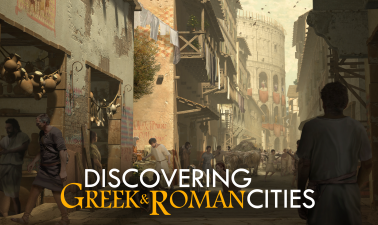MOOC on ancient cities kicks off today
Today, the MOOC “Discovering Greek & Roman Cities” starts. It is a Massive Open Online Course on ancient urbanism and urbanity for everyone interested.

Already before kick-off, 1800 people have enrolled in the course, which is in both English, French and German. They can look forward to engaging with ancient Greek and Roman cities of different sizes and importance, with those who once inhabited these cities, with methods of urban archaeology, and with the heritage of ancient urbanism. In the course of eight weeks, eight modules with video lectures, interviews with experts, quizzes, and assignments will shed light on ancient cities for students, scholars, stakeholders, and everyone else interested.
A European cooperation on digital learning
Scholars from six European universities (Kiel University, Aarhus University, University of Athens, University of Bergen, University Paris I, and Open University of the Netherlands) have worked together to create this course that takes the course participants through several Greek and Roman cities and explore city life as it unfolded in antiquity. From the Danish National Research Foundation’s Centre for Urban Network Evolutions, centre director professor Rubina Raja and assistant professor Michael Blömer have participated in developing the video-based and interactive MOOC, and they will teach at this pan-European digital learning module. The latest research and state-of-the-art information on the topic is incorporated into the course that moves far beyond handbook knowledge.
Several UrbNet subprojects are represented when the course participants will engage with the mega city of Rome, the desert city of Palmyra in Syria, the Decapolis city of Jerash in Jordan, and Doliche in Turkey, home of the famous god Jupiter Dolichenus. Also many other famous as well as less famous Greek and Roman cities will be explored. Basic knowledge of chronology and historical development as well as an understanding of the diversity of the shared European heritage and the preservation of cultural heritage will be important objectives of learning.
The Strategic Partnership “Ancient Cities” has been co-funded by the ERASMUS+ Programme of the European Union.
